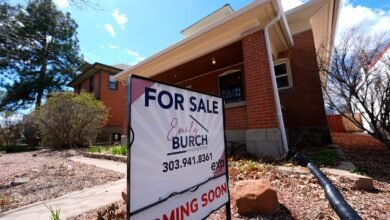Kentucky widow is forced to file for bankruptcy to save her home after husband’s death froze his bank account and mortgage payments and triggered foreclosure

- Carol Haynes, 80, offered the story to a local news station in Kentucky last week
- Her husband’s death triggered a freeze on his accounts. Payments were stopped
- Foreclosure rates across the country continue to creep up after the pandemic
A Kentucky widow has detailed how she forced to file for bankruptcy to save her home following her husband’s death.
Carol Haynes, 80, offered the story to a local news station in Kentucky – as foreclosure rates across the country continue to creep up after the pandemic.
The financial pit created by the crisis, she said, affected her and her husband of 25 years – after the killer virus claimed his life in 2022.
His death triggered a freeze on his bank accounts, seeing their automatic mortgage payments on their two-bedroom home in Florence halted.
This occurred unbeknownst to her – and led to the bank to file for foreclosure, she told Local 12 WKRC-TV. Haynes then received a letter stating the home would be auctioned off on May 23, leading her to file for bankruptcy.
This put a stop to sale despite the fact she had relatively healthy finances, she said – as she hopes that evidence of a loan modification he daughter made enabling them to make payments plays out in bankruptcy court.
‘I want to be around his things,’ she said of the home in Northern Kentucky, once shared with longtime love Ed Haynes.
‘I can feel him here. I think if I left here, I wouldn’t live long,’ she added.
Now able to pay the mortgage, she recalled the outset of the crisis – when not only was she reeling from the loss of Ed, but recovering from a bout with Covid herself.
A freeze on his bank accounts ensued, and the automatic mortgage payments to the bank stopped, she said.
‘Did you just think this stuff was getting taken care of?’ a Local 12 reporter asked, referencing how this all happened with her being unaware.
Stepdaughter Tiffany Tormey, the one who was able to negotiate a successful loan modification, was the one to reply.
‘I did, I did!’ said Tormey, 42, adding, ‘I thought [my mom] was okay and just didn’t want to bother me.
‘It was just a little bit of a miscommunication.’
That miscommunication caused her late husband’s bank to begin proceedings to the put the house up for foreclosure – a process that usually results in a lender repossessing the property before attempting to sell it to recover losses
However, upon hearing the news months later, Tormey was able to successfully negotiate a loan modification that would ‘bring the loan current [and] put the arrearages on the end,’ she told Local 12.
‘And we would just make the payments.’
But the bank was already in the process of the selling the loan, both said – leaving them in a lurch when it came to rectifying the situation.
Meanwhile, Tiffany helped her stepmom make the payments, as the bank unloaded the agreement to a new owner.
The new mortgage holder, however, never received the amended agreement, leading him once again filed for foreclosure.
Tormey proceeded to send proof of the modification to the mortgage holder, to no avail.
Unable to circumvent the bureaucratic red tape big banks are famous for, her mother received a letter stating her home would be auctioned off on May 23.
That spurred her savvy, senior stepmom to file for bankruptcy – despite having the money to make the payments.
A day earlier, the man who would have carried out the sale, Boone County Master Commissioner Larry Dillon, said the only thing that could save the pair was a court order from a local judge.
‘If I have an order from the circuit judge directing me to sell a property,’ Dillon said in a video interview a day before the widow stopped the sale in its tracks. ‘I have to sell it.’
‘Obviously, you don’t want to see a little old lady kicked out of her house… but I cannot unilaterally take the step of canceling a sale.
‘If I do, I’m in violation of a court order,’ said Dillon.
He added that Carol could file for bankruptcy – advice she seemingly took.
She now hopes that evidence of the loan modification will sort everything out in bankruptcy court – even if the stage is usually meant for people who can no longer pay their debts.
Providing a fresh start by liquidating assets to pay their debts or by creating a repayment plan, the practice, for now, has saved Haynes.
The loss of her husband, however, still looms large.
‘It was a wonderful marriage,’ Haynes told the station from her home in Florence. ‘A happy one. I’ll see him again.’
She added, ‘I lost him quick – but I guess it was better than him suffering for a long time.’
Foreclosures – which can take the form of default notices, auctions or repossessions by the bank who signed off on the loan – are currently affecting thousands of Americans.
ATTOM’s latest February 2024 Foreclosure Activity report showed a total of 32938 U.S. properties with foreclosure filings – up up 8 percent from a year ago.
Rob Barber, CEO at ATTOM, said at the time: ‘The annual uptick in U.S. foreclosure activity hints at shifting dynamics within the housing market.
‘These trends could signify evolving financial landscapes for homeowners, prompting adjustments in market strategies and lending practices.
‘We continue to closely monitor these trends to comprehend their complete effect on foreclosure activity.’
Source link





